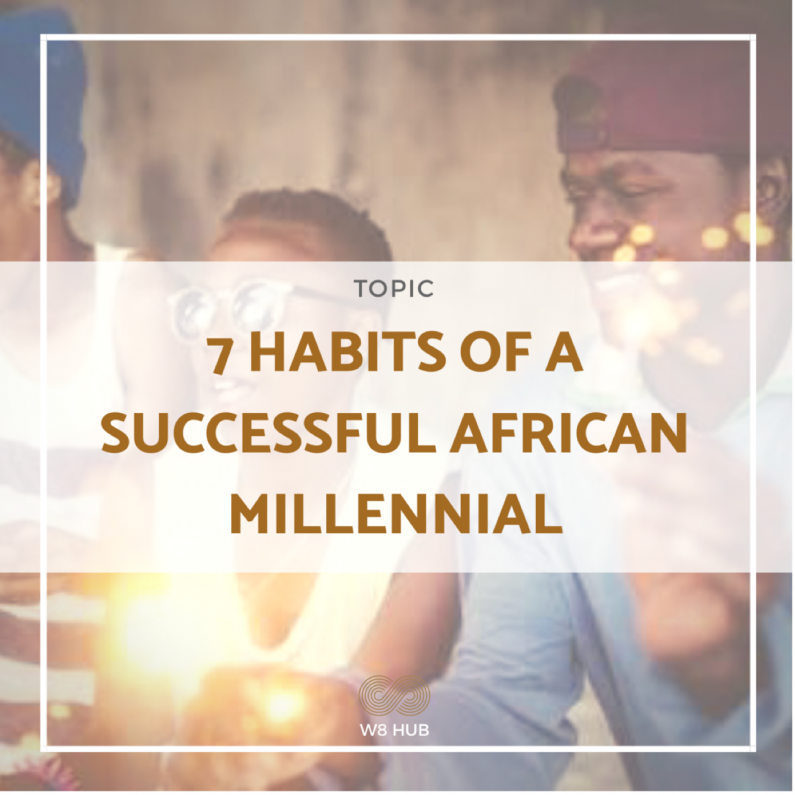
AFRICA is the ‘youngest’ continent in the world. Out of a population of about 1.3 billion people, about 51% are aged 21 and below, and another 30 % are between 21 - 38 years old. Millennials are those born between early 1980s - 1995 which makes the oldest millennial about 38 years old and the youngest about 23 years old. (The under 21s are referred to as Generation Z.)
As a socioeconomic group, millennials are growing in power and investment potential. They are influencing marketing and advertising strategies across the African continent. As important as it is to understand this important demographic, it is also vital that the older ‘baby boomer’ generation (born in the 1960s and 1970s) should provide good role-models and mentors to the future leaders of our continent.
Let’s consider the 7 habits of a Successful African Millennial. This is not a blueprint or an attempt to create a stereotype, but a discussion of the features that distinguish those that are ‘most likely to succeed’ at navigating the tricky slopes of life as a young African.
1. MAKE FINANCIAL LITERACY A PRIORITY
 Advancing financial literacy is considered a priority for a successful millennial. Many save up to 10% of their monthly earnings and would like to better understand financial management and how to invest wisely. More young Africans are striving for financial independence and prosperity. They believe in the need to pursue financial education as they strive for success, with the objective of taking control of their own destiny and economic future. W8 Hub is a platform and network established to nurture and encourage millennials on a lifetime of financial fitness and ultimate goal of financial freedom.
Advancing financial literacy is considered a priority for a successful millennial. Many save up to 10% of their monthly earnings and would like to better understand financial management and how to invest wisely. More young Africans are striving for financial independence and prosperity. They believe in the need to pursue financial education as they strive for success, with the objective of taking control of their own destiny and economic future. W8 Hub is a platform and network established to nurture and encourage millennials on a lifetime of financial fitness and ultimate goal of financial freedom.
2. WEALTH MUST MAKE A POSITIVE SOCIAL IMPACT
 Authenticity and moral consciousness are key and emerging values of African millennials as they view success not only in monetary terms. Having been raised by a generation who have not done enough to eradicate poverty and whose social values are blighted by a focus on material wealth and a shallow, bling lifestyle, the successful African millennial is adopting a moral compass that directs their attention to social issues, such as the widening gap between the rich and the poor. They want to use their wealth to create a positive impact. Given that about 30% of the population of the African continent is made up of millennials, their consistent commitment to social transformation could help transform the continent from the poverty-stricken basket case that still exists and is often portrayed by the western media.
Authenticity and moral consciousness are key and emerging values of African millennials as they view success not only in monetary terms. Having been raised by a generation who have not done enough to eradicate poverty and whose social values are blighted by a focus on material wealth and a shallow, bling lifestyle, the successful African millennial is adopting a moral compass that directs their attention to social issues, such as the widening gap between the rich and the poor. They want to use their wealth to create a positive impact. Given that about 30% of the population of the African continent is made up of millennials, their consistent commitment to social transformation could help transform the continent from the poverty-stricken basket case that still exists and is often portrayed by the western media.
Successful African millennials also care more about matters to do with political participation, civic engagement and public affairs. Social media is an important tool through which millennials voice their concerns and engage on issues that matter to them, e.g. campaigns such as #BringBackOurGirls and #FeesMustFall, attracted massive support from millennials.
Within the world of philanthropy, platforms and networks dedicated to nurturing and spreading the practice of strategic and long term giving now thrive. These include the African Philanthropy Forum (AFP) and Nexus Global, which provide successful millennials with a voice and a means of engaging in impactful philanthropy. Successful African millennials are more likely to engage in social impact investment, or to demand for investment advice that supports an impact agenda.
3. BE TECH-SAVVY - WITH A HUMAN FACE
 One of the biggest defining characteristics of African millennials is their usage and dependence on mobile phones. African millennials use social media sites as tools for communication, sources of news and information and for marketing goods and services. However, successful millennials do not stay online all day! They know their phones can be a distraction and will go to great lengths to protect their time and to focus on their work and studies. They learn to keep their phones on silent and will ensure they stay in control of how much time they spend surfing the net, as this too can be a negative distraction.
One of the biggest defining characteristics of African millennials is their usage and dependence on mobile phones. African millennials use social media sites as tools for communication, sources of news and information and for marketing goods and services. However, successful millennials do not stay online all day! They know their phones can be a distraction and will go to great lengths to protect their time and to focus on their work and studies. They learn to keep their phones on silent and will ensure they stay in control of how much time they spend surfing the net, as this too can be a negative distraction.
Successful millennials use the internet as a business tool. Their capacity to gather data online helps them to leverage information to use to make informed business decisions. They keep track of business news sites like Wall Street Journal, Bloomberg and domestic news portals, and stay abreast of changes in trends about products and services, as well as any regulatory changes that may affect their business.
4. FIND GOOD MENTORS
 Successful millennials do not claim to know it all. Their goal is to absorb as much information as possible from wiser and usually, older friends and mentors. Good mentors help develop good habits (such as, work ethics and financial education and leadership skills), and help open up resources and networks, as well as encouraging ‘thinking on your own feet’ to develop success potential.
Successful millennials do not claim to know it all. Their goal is to absorb as much information as possible from wiser and usually, older friends and mentors. Good mentors help develop good habits (such as, work ethics and financial education and leadership skills), and help open up resources and networks, as well as encouraging ‘thinking on your own feet’ to develop success potential.
Finding a good mentor involves being worthy of one. It is important to have clear objectives of what you want out of the mentorship relationship. Consider a mentor who is already in your professional or business sector as someone whose expertise and experience you can benefit from. A good mentor should share your personal values and should be willing to make time for you, providing advice and even hard truths when needed. The perfect mentor is both a coach and a cheerleader, pushing you beyond your comfort zone and cheering on your successes as if they were their own!
5. RESPONSIBLE USE OF THE INTERNET
 Successful African millennials know that nothing on social media is private, therefore practising responsible online behaviour is a vital habit.
Successful African millennials know that nothing on social media is private, therefore practising responsible online behaviour is a vital habit.
A few tips on social media etiquette that are practised by successful African millennials:
- Do not post comments or photos or videos that encourage or suggest illegal activity
- If you affiliate your job with your social media profile, keep in mind you are representing both yourself and your employers
- Use privacy settings and security policies on social media networking sites
- Think about what you want your social media use to say about you
6. BE A REALISTIC ENTREPRENEUR
 Millennials are five times more likely to give up a financially secure job which they consider ‘boring’ for the thrill of building their own company, with visions of an IPO or being acquired by a dominant player in the same market for millions of dollars, within a few years. Unfortunately, social media is filled with the hype and stories of such phenomenal success that young people are lulled into an unrealistic expectation of instant success. We live in a world of instant gratification, fostered by the posts on Facebook and Instagram, which only seem to project images of success and celebrity lifestyles.
Millennials are five times more likely to give up a financially secure job which they consider ‘boring’ for the thrill of building their own company, with visions of an IPO or being acquired by a dominant player in the same market for millions of dollars, within a few years. Unfortunately, social media is filled with the hype and stories of such phenomenal success that young people are lulled into an unrealistic expectation of instant success. We live in a world of instant gratification, fostered by the posts on Facebook and Instagram, which only seem to project images of success and celebrity lifestyles.
The truth about entrepreneurship is that it is not for the faint hearted! It usually involves working long hours for no monetary compensation for a very long time. Most businesses do not make any profit in the first three years and over 70% of businesses fail within the first five years.
Successful African millennials learn to think on their feet quickly and appreciate the reality of the hardship of being an entrepreneur, if they decide to take the risk of being one. They are not easily taken in by the stories of the ‘rich & famous’ portrayed on social media. They know that business heroes like Mark Zuckerberg, Elon Musk, the late Steve Jobs, Jay-Z etc are held up as role models, but the harsh reality is that for each one of these success stories there are over a thousand others who never made it big or who are still struggling and striving for commercial success in their businesses. They also know that part of the problem with just seeing the end product is that we don’t appreciate the journey, the grind, the long hours of often tedious, frustratingly hard work that it takes to become a beacon of success.
The successful African millennial knows the value of being an understudy or trainee in their chosen field before striking out on their own. Taking the time to learn transferable skills such as communication, negotiation and commercial knowledge, as well as the discipline and patience of acquiring good work ethics is invaluable on the road to successful entrepreneurship. The journey to becoming an entrepreneur (or a skilled professional) is often challenging. It demands discipline, perseverance, and most importantly a deep-seated passion for whatever career or business venture you set out to establish.
7. PRIORITISE YOUR MENTAL HEALTH & EMOTIONAL WELL-BEING
 Being a ‘super-connected’ African millennial is a double-edged sword. Numerous studies have shown that an increase in depression, anxiety, loneliness can be attributed to social media. If you are a millennial, it is likely that your biggest weakness is ‘perfectionism’. An increasing number of millennials experience the pressure of meeting high standards in their university and professional qualifications, their physical looks and lifestyle. This can be blamed partly on social media. The pressure to be (and look) ‘perfect’ is centred around the need to measure up to the images projected on social media, of people with a perfect life and perfect look. Anyone with an Instagram account can relate to this. We live in a world in which our lives are now a public performance on social media for others to admire and envy. This may lead to feelings of isolation and depression amongst those that feel that they don’t measure up to the perfectionism displayed online.
Being a ‘super-connected’ African millennial is a double-edged sword. Numerous studies have shown that an increase in depression, anxiety, loneliness can be attributed to social media. If you are a millennial, it is likely that your biggest weakness is ‘perfectionism’. An increasing number of millennials experience the pressure of meeting high standards in their university and professional qualifications, their physical looks and lifestyle. This can be blamed partly on social media. The pressure to be (and look) ‘perfect’ is centred around the need to measure up to the images projected on social media, of people with a perfect life and perfect look. Anyone with an Instagram account can relate to this. We live in a world in which our lives are now a public performance on social media for others to admire and envy. This may lead to feelings of isolation and depression amongst those that feel that they don’t measure up to the perfectionism displayed online.
A successful millennial entrepreneur refuses to be susceptible to the lure of perfectionism as a metric to measure all aspects of their lives. Whilst perfectionism may motivate and encourage us to aim high and achieve great things, the reality is that we cannot all be ‘perfect’ all of the time. Instead of becoming an emotional wreck when life does not appear as perfect as the lovely lies portrayed online, a successful millennial will adopt a resilient, positive and optimistic outlook that will see him or her through life’s ups and downs.
A few tips for life practices adopted by successful African millennials, to maintain emotional and mental wellbeing include:
- Limit social media exposure
- Prioritise actual physical face time with family, friends, colleagues and mentors you care about
- Work out regularly
- Focus on achieving personal and professional goals
- Manage your work-life balance (by compensating those busy hectic periods by taking regular, short breaks doing something relaxing)
- Practise meditation as an active part of the mind’s operating system. (This helps to maintain a clear mind through difficult situations and challenges)
- Talk to a friend, family member or mentor, if you feel low or depressed and incapable of coping with daily life tasks and activities. Untreated mental health issues affect our overall sense of joy and quality of life.
Unfortunately, the stigma of mental health often results in a reluctance to seek treatment thus delaying recovery.
Successful African millennials are more open to accepting help and talking about their emotions and mental health. If necessary, it is important to seek professional help from a mental health practitioner (which may be a psychotherapist, psychologist or psychiatrist). The more you are able to open up about your worries, the more a qualified professional may be able to support your emotional health and well-being.



